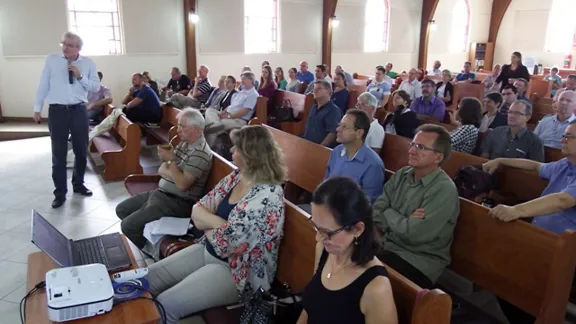
The head of Brazil's Lutheran church says talks could counter unpredictable and dangerous divisions in Brazil. Photo: LWF Brazil
Catholic-Lutheran document offers guidelines to local situation
(LWI) – Brazilian Lutheran church leader Rev. Dr Nestor Paulo Friedrich has emphasized the need for dialogue in the country, which is going through a critical social, political and economic crisis. He noted that the publication From Conflict to Communion: Lutheran–Catholic Common Commemoration of the Reformation, in 2017, offers insights that could inspire such discussion.
Public protests that began last year in Brazil over poor economic management by the current government have resurfaced, including calls to impeach President Dilma Rousseff. The country, which will host the 2016 summer Olympics in August, is also struggling to deal with the mosquito-transmitted Zika virus.
In an address to a conference of pastors and other church workers from the Rio dos Sinos Synod of the Evangelical Church of Lutheran Confession in Brazil on 29 March, Friedrich said ”today we have new demands, and dialogue is one of them.”
Are we tired of the opportunity to live in a democracy that sustains dialogue?
Rio dos Sinos is one of the 18 regional synods that make up the 700,000-member church, a member church of The Lutheran World Federation (LWF).
Friedrich took the church’s watchword for 2016, “Seek good and not evil (Amos 5:14),” as a starting point when he spoke of the need for closer collaboration in order to fulfill the church’s mission and respond to emerging needs in Brazilian society.
Safeguard democracy
In mid-March, Friedrich sent a statement to all the synods, encouraging pastors to seek opportunities for dialogue in a democracy now threatened by “unpredictable and dangerous divisions.”
Friedrich noted that Brazilian democracy was developed after a laborious process of enabling people to engage with each other through dialogue but this was currently threatened in the growing atmosphere of tension.
Watching the news in Brazil gave the impression the country was losing its capacity to dialogue, he said. “Will we forget what we have achieved with so much effort? Are we tired of the opportunity to live in a democracy that sustains dialogue?”
He said From Conflict to Communion could help Brazilians initiate dialogue in the midst of conflict and power struggles in the country of 200 million people. "In the sixteenth century, Catholics and Lutherans not only misunderstood each other frequently but they also exaggerated and caricatured their opponents, exposing them to ridicule,” Friedrich added.
Published by the Lutheran-Roman Catholic Commission on Unity, on behalf of the LWF and the Pontifical Council for Promoting Christian Unity, From Conflict to Communion is available in 12 languages including Portuguese. It is the first joint account by Catholics and Lutherans about the history and implications of the struggles to reform the church 500 years ago.
In October, LWF and the Vatican will hold a joint ecumenical commemoration of the Reformation in Lund, Sweden. The 2017 anniversary of the Reformation will also mark 50 years of Lutheran-Catholic dialogue.


